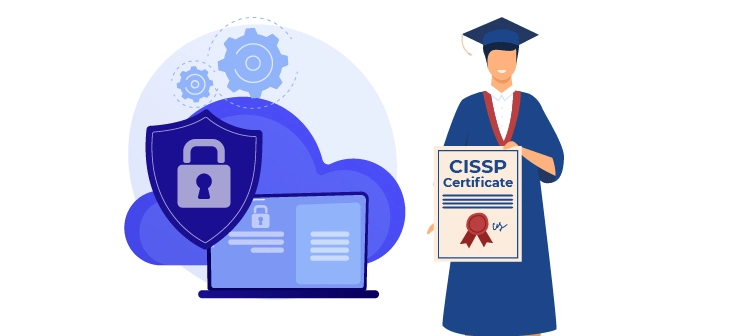 Jon Baleva
Dec 17, 2024
Jon Baleva
Dec 17, 2024

CISSP (Certified Information Systems Security Professional) is a globally recognized certification that shows you have the knowledge and skills to safeguard information systems, both physical and virtual. The CISSP certification is the gold standard in information security certifications.
The CISSP credential is recognized as an international benchmark for fittest practices and expertise in the field of information protection, which means that it is an excellent addition to your resume if you want to land a cybersecurity job.
With so many cybersecurity jobs in high demand, it is essential to get certified to boost your career in cybersecurity. This blog post will help you with all you need to know about the CISSP Exam and some great tips on preparing and passing for the CISSP exam with ease.
CISSP is the acronym for Certified Information Systems Security Professional. The CISSP certification has been a "gold standard" in information security as it can help you upskill your cybersecurity abilities and knowledge.CISSP experts can proactively manage risk by understanding threats before they materialize and identify vulnerabilities across your entire enterprise network, and build business value with senior stakeholders through tackling some of their top concerns.
With high-quality CISSP certification training , you can attain international recognition that validates expertise in security within data processing systems from technical and non-technical perspectives. The CISSP exam mainly covers the eight domains of cybersecurity. They are:
Read Also : CISSP Exam Pattern Changes
CISSP is an information security certification for professionals accredited by International Information System Security Certification Consortium, also known as (ICS)2. The experts developed it to provide a benchmark of knowledge and experience within the cybersecurity industry and ensure that you are updated on all current trends and methods used by cybercriminals.
To appear for the CISSP examination, the candidate must have a minimum of five years of work experience in two or more of the eight domains of the CISSP Common Body Knowledge (CBK). In addition, having a four-year college degree or an additional credential from (ICS)2 approved list will satisfy one year of required work experience.
The CISSP Certification covers knowledge and skills concerning cybersecurity such as physical security, cryptography, access control systems and methodology, disaster recovery planning, management practices, telecommunications, network security, and many more.
By having an established body of knowledge on which to base training programs, CISSP aims to keep IT security practitioners modernised while also demonstrating that they have mastered today's standard practices. In addition, it helps employers hire qualified candidates who will stay abreast of future changes and updates within the industry.
The CISSP certification contains a linear form of examination and the newly formed CAT (Computerised Adaptive Testing) exam. Your CISSP exam preparation remains constant as the subjects covered in both forms of exams are the same.
The linear form of the exam contains a total number of 250 multiple choice questions in six hours. Therefore, you will need to acquire a minimum of 700 out of 1000 points to pass the exam. The test is available in multiple languages like English, French, German, Portuguese, Spanish, Japanese, Korean, and simplified Chinese.
The CISSP CAT exam requires the candidate to attempt 100-150 multiple choice questions within three hours. The passing grade is a minimum of 700 out of 1000 points. The exam is offered in the English language at the Pearson VUE and (ICS)2 Authorised PPC Testing centres.
Read Also : How to Become a Certified Information Systems Security Professional?
Professionals with the CISSP certification are deemed to have a high level of cyber and information security expertise as an asset sought by employers. The value of this certificate has increased over time as more organizations invest in cybersecurity measures. Some essential tips that can help your prepare for the exam and score high are given below:
The CISSP exam contains eight domains: Security and Risk Management, Asset Security, Security Architecture and Engineering, Communications and Network Security, Identity and Access Management, Security Assessment and Testing, Security Operations, and Software Development Security.
You should be familiar with the cybersecurity concepts such as specific types of attacks on networks like viruses that can disrupt operations by destroying files or crashing devices, methods used to protect against them, including encryption techniques and many more.
It would be best to note your strengths and weaknesses when preparing for the CISSP certification exam. Ensure that you have thoroughly read all the materials provided by these sources listed above, so you will know what topics were covered in more detail than others and which ones are weaker.
Your success comes from adequate training. Hence, make a study plan that fits best for you. Utilize flashcards, study materials, domain guides and acquit to the exam subjects. Learn through your methods and do not depend solely on online materials.
CISSP requires a lot of preparation time; hence, the best way to prepare for the exam is by taking as many practice exams and mock tests as possible. In addition, it will help make sure that your knowledge base in each subject area is on point, and if not, then know what part of the material needs more attention.
With the help of mock tests, be prepared with knowledge on various question types that will likely appear in your exam. Although preparation takes time and work at first, eventually learning how much easier they become should make it all worthwhile.
Joining a study group may be beneficial to some because it is easy to share ideas and get feedback from others who are in your shoes. Online communities allow people with similar interests or goals to interact through blogs and forums. You can get information and answers from certified professionals, and you can verify the source's credibility.
The eight domains are all equally important as the other, and you must focus on all of them. Through the journey of preparation, lean onto weaker domains to balance your knowledge and skills. Do not fear your weakness. Identify your knowledge gap and ensure that you are thorough in all eight domains.
Schedule your days and time to study for the CISSP exam. Divide your days, weeks, and months over the whole subject material to complete it. Maintain consistency in learning to avoid any trouble retaining the information needed to pass the CISSP exam. Split your time into reviewing study materials, taking practice tests, and peer group studies. This way, you will be able to cover the portions equally and within schedule.
CISSP exams are a mixed bag of questions, with the majority being scenario-based or judgment. The scenarios can be very similar to one another, and you will need excellent judgment skills to pick out which option is best for each question.
You will be given a scenario and have to pick out the best option. In most cases, all these choices will be correct logically; however, that does not mean it will guarantee your answer is correct since there is no wrong option in this case. You rely on your judgment skills combined with a managerial perspective, so being well prepared for such questions can help keep you calm when answering them based on their respective importance.
Your primary focus for the exam day should be that you should exhaust yourself. Make sure you have every material prepared for the exam day, like identification, writing material and so on. Avoid last-minute learning to evade anxiety. Remove any limiting beliefs of negative thoughts from your mind and stay focused and confident.
Good night sleep is vital for any exam day. You should avoid cramming the material at the last minute to stay calm and focused on the exam questions. Retain your energy for the exam day. Try to relax and avoid distractions and keep calm during the examination.
In the last step, implement your exam strategy. It would help if you had a study plan with a good balance between studying and working on actual practice exams. Focus on time management and make sure you know what to expect in the CISSP Exam.Keep yourself organized during preparation and while taking the test so that every topic is precise before getting into the test. Your confidence is tested on each question so, stay calm and answer confidently.
Read Also : Job Roles and Responsibilities of a CISSP Professional
To Sum Up
The CISSP is one of the essential certifications in cybersecurity. The exam covers a wide range of topics, but there are few ways to prepare for it and pass flying colours. We have summarized them so you can be well-prepared before taking the test. Prepare by reviewing all study materials thoroughly, taking as many practice tests as possible, and avoiding cramming at the last minute. Make sure that your environment is favourable to concentrate when studying. Muster in your confidence and stay relaxed when you take up the CISSP examination.